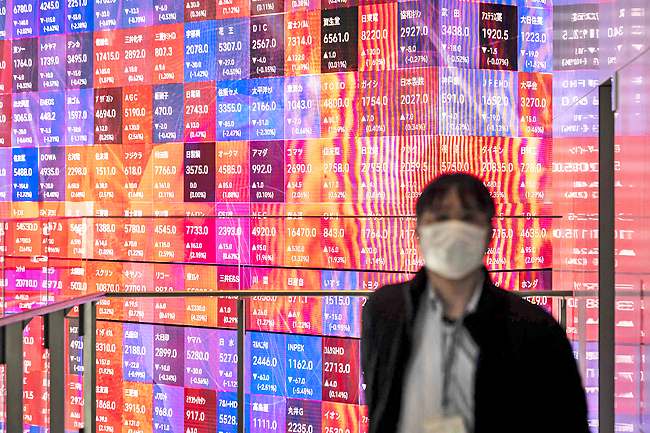HONG KONG (AFP) – Equities bounced back yesterday from the previous day’s rout with investors taking their lead from a rally on Wall Street after Washington decided against imposing the stiffest sanctions on Russia over its invasion of Ukraine.
Russian President Vladimir Putin’s decision to send troops into Ukraine sent shockwaves through Asian and European markets and sent oil past USD100 for the first time since 2014 as traders contemplated a major conflict in Eastern Europe.
Speculation had been growing for weeks about an incursion, which has stoked fears about supplies of key commodities including wheat, metals and crude. Investors have also been fretting over the impact of any sanctions Western leaders would impose on Moscow.
Despite a chorus of outrage at Putin’s move, the punishments have so far been seen as well short of the most stringent.
While the latest measures from Washington target Russia’s two largest banks and see controls on high-tech items aimed at crippling its defence and aerospace sectors, United States (US) President Joe Biden has not cut off oil exports.

The news provided a big boost to Wall Street, where all three main indexes surged from deep in the red to end on Thursday on a positive note, while crude eased back below USD100.
The Nasdaq was the standout performer, ending more than three per cent higher as commentators said the crisis could keep the Federal Reserve from embarking on an aggressive series of interest rate hikes to tame inflation.
Tech firms are more susceptible to higher borrowing costs and have been hammered in recent months on bets for tighter monetary policy.
“Stocks don’t always move in the way we expect them to,” Callie Cox, at trading platform eToro, said on Bloomberg’s QuickTake Stock broadcast. “We’re sitting here processing these headlines and trying to understand what they mean for the global economy, but first and foremost, fear is a contrarian indicator.
“While we’re all rightfully fearful right now, some investors may be seeing this as a time to jump back in.”
The gains in New York filtered through to Asia, where Tokyo climbed two per cent and Mumbai 2.7 per cent, while Seoul, Jakarta, Bangkok and Wellington added more than one per cent.
There were also gains in Shanghai, Sydney, Singapore and Taipei, though Hong Kong struggled and suffered fresh selling.
Traders are keeping a close eye on developments in Ukraine as Russian troops close in on Kyiv. Oil rose again with Brent back above USD100 a barrel as traders remained sensitive to headlines and analysts warned the conflict could keep prices elevated for months.
Wheat, a major export from the region, was at its highest level since 2008 as analysts warned exports will likely dry up for the time being. The caution came despite signs of progress on Iran nuclear talks that could see it begin exporting crude globally again, ramping up supplies at a time when demand is soaring as the world reopens.



















































